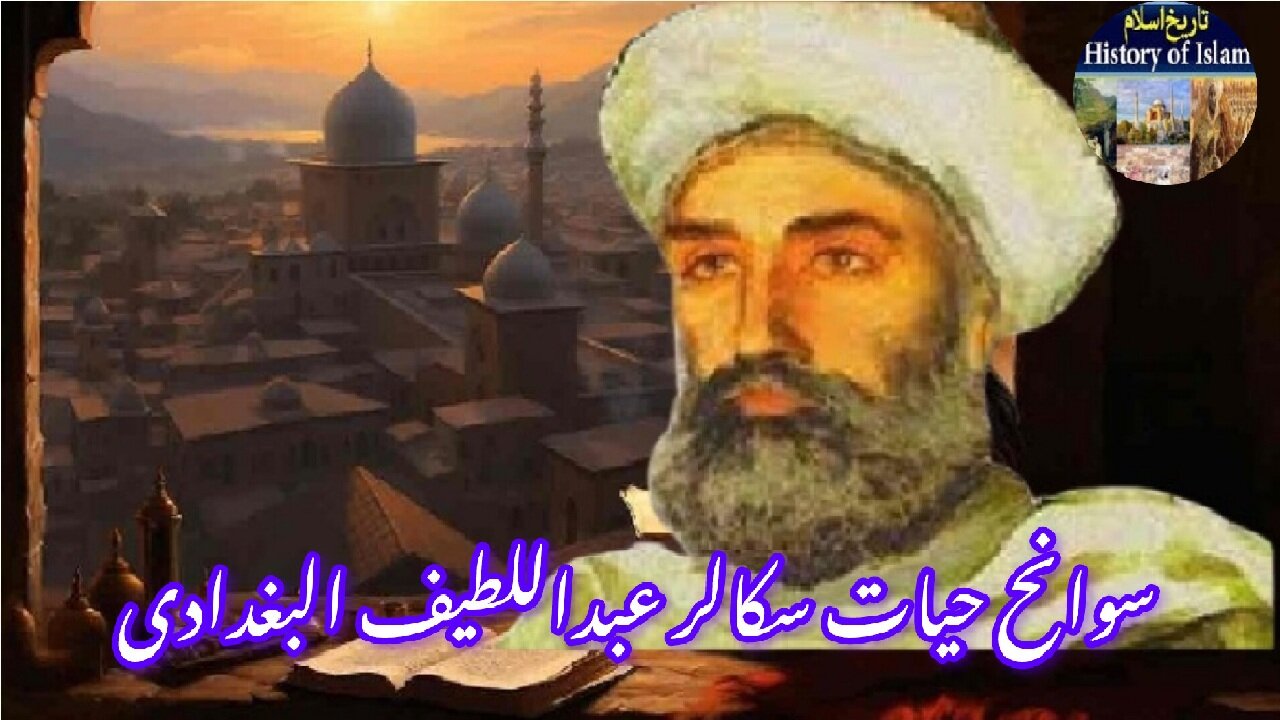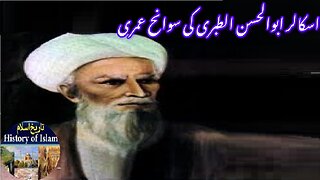Premium Only Content

Biography Abdul Latif al-Baghdadi जीवनी अब्दुल लतीफ अल-बगदादी سیرت عبداللطیف البغدادی
@islamichistory813 #abdullatifalbaghdadi #biography #islamichistory #islamicscholars #islam #history #scholars #hadith #quran #sunnah #islamic #legacy #heritage #wisdom #fiqh #knowledge #tafsir #faith #guidance #islamicworld #muslim #islamiclegacy #imams #islamiccivilization #goldenage #truth #ummah
Biography of Abdul Latif al-Baghdadi
Assalamu Alaikum, we welcome you to our series on Muslim Heritage and Islamic Scholars, today we will present the biography of Abdul Latif al-Baghdadi (Mu'affiq al-Din Muhammad Abdul Latif ibn Yusuf al-Baghdadi).
Abdul Latif al-Baghdadi, known as Mu'affiq al-Din Muhammad Abdul Latif ibn Yusuf al-Baghdadi, was a prominent Muslim physician, philosopher, and traveler. He was born in Baghdad in 1162 CE (557 AH) during the Abbasid Caliphate, a time when Baghdad remained a center of learning despite the political decline of the Abbasids. His family was known for its intellectual interests, and from an early age he showed a deep passion for learning. His title "al-Baghdadi" indicates his strong connection to Baghdad, although his career took him to most parts of the Islamic world.
Al-Baghdadi received his early education in Baghdad, where he studied grammar, philosophy, and Islamic studies. He soon became interested in medicine, natural sciences, and philosophy, specializing in these fields. His quest for knowledge led him to travel extensively: he studied in Mosul, Damascus, Aleppo, and Cairo, meeting the leading scholars of his age. Among his most influential teachers were the philosopher Shahrazad and several notable physicians. These travels not only broadened his knowledge but also connected him with scholars from across the Islamic world.
He was known for his expertise in medicine and anatomy and his critical approach to earlier authorities, including Galen and Avicenna. One of his most notable contributions was his rectification of Galenic anatomical errors. Al-Baghdadi personally studied the human skeleton and argued against Galen's long-accepted views, particularly regarding the structure of the lower jaw and sacrum. This made him one of the earliest Islamic scholars to emphasize experimental observation in medicine, a major step towards scientific progress.
In addition to medicine, al-Baghdadi was also interested in history and travel. His most famous historical work, Kitab al-Afadah wa al-Habbar ("Book of Guidance and Advice"), describes his experiences in Egypt, especially during the Great Famine of 1200–1202 CE (597–599 AH). In this work, he described in detail the conditions in famine-stricken Egypt, including reports of starvation, social breakdown, and even genocide. His observations are considered one of the most reliable historical records of medieval Egypt and an invaluable source for historians.
Al-Baghdadi lived during the Ayyubid dynasty and spent significant time in Cairo, where he served in scholarly and medical circles. He was highly respected by rulers, scholars, and students. His vast knowledge extended to philosophy, logic, medicine, grammar, and theology**, making him a true polymath of his time.
He died in Baghdad in 1231 CE (629 AH) at the age of about 69. His death brought to an end a brilliant life of travel, scholarship, and scientific research. He was buried in Baghdad, the city of his birth, which had nurtured his early education, and to which he returned in his later years.
The history of his shrine reflects the reverence that scholars and students held for him. His tomb in Baghdad became a place of veneration, visited by seekers of knowledge and admirers of his works. While the Mongol invasions of 1258 CE destroyed Baghdad's intellectual heritage, al-Baghdadi's memory was perpetuated through his writings and the continued respect for his resting place. Historical accounts indicate that his tomb was located in a prominent cemetery in Baghdad, and although centuries of political turmoil have obscured many of the shrines, his burial site is remembered by historians and biographers of Islamic scholars.
Today, Abdul Latif al-Baghdadi is remembered as a brilliant physician, historian, and philosopher, who combined experimental science with profound Islamic scholarship. His emphasis on observation and his bold refutation of previous authorities highlight his independent spirit and scientific rigor. His works continue to be studied by scholars of Islamic medicine and history, and his legacy lives on as a shining figure in Baghdad’s intellectual heritage. His tomb, although not as prominent as it is today, is a symbol of enduring respect for scholars who dedicated their lives to the pursuit and preservation of knowledge.
With that, we ask your permission until tomorrow, and tomorrow we will narrate the biography of al-Muradi ibn Khalaf al-Muradi. We will also describe the history of his shrine. Finally, we pray to Allah Almighty to grant us the ability to act on the Quran and Hadith, Amen.
Allah Hafiz
==================================
-
 7:23
7:23
ISLAMIC HISTORY
21 hours agoBiography of Islamic Scholar Abul Hasan al Tabari اسلامی اسکالر ابوالحسن الطبری کی سوانح عمری
5 -
 2:02:00
2:02:00
Game On!
18 hours ago $0.49 earnedTwo 40 Year Old QBs BATTLE It Out On Thursday Night Football!
11.7K1 -
 1:22:45
1:22:45
Tucker Carlson
12 hours agoTucker & Steve Bannon on Jay Jones’ Desire to Genocide Republican Kids and the Future of the Right
94.8K171 -
 12:21
12:21
Ken LaCorte: Elephants in Rooms
18 hours ago $1.31 earnedWill Trump Take Greenland?
7.47K13 -
 36:57
36:57
RiftTV
11 hours agoPREMIERE: DC Dive with Jordan Conradson | Guest: Ben Bergquam | Pilot Episode #1
29.8K5 -
 8:35
8:35
Faith Frontline
13 hours agoAndrew Huberman Just SHOCKED The World With His Belief in God
7.33K7 -
 1:59:43
1:59:43
BEK TV
1 day agoTrent Loos in the Morning - 10/16/2025
24K3 -
 1:58:09
1:58:09
Dialogue works
2 days ago $4.12 earnedLarry C Johnson & Paul Craig Roberts: Can peace be imposed on Israel? - Russia and China Step In
43.4K17 -
 8:10
8:10
Nate The Lawyer
2 days ago $3.83 earnedNY AG Letitia James Pattern | All 3 Mortgages Have False Statements
27.6K32 -
 17:35
17:35
Actual Justice Warrior
1 day agoDMV Workers CAUGHT Selling CDL Tests To Migrants
30K45